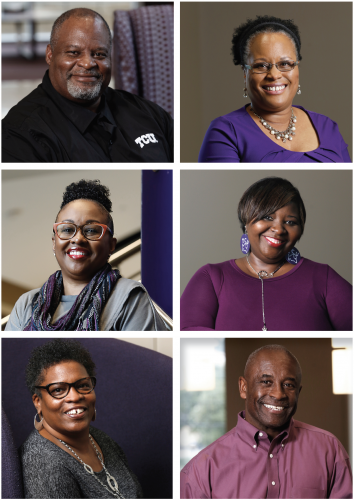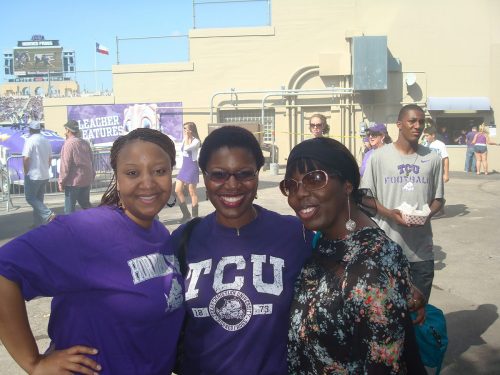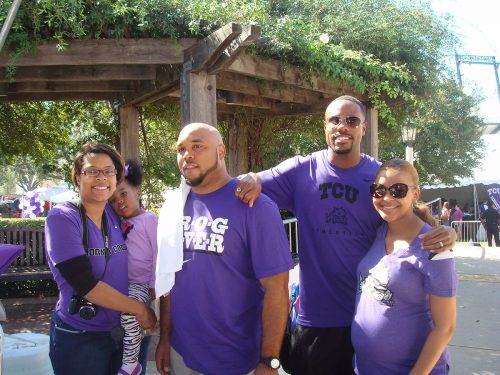Black Alumni Alliance Celebrates Community
The affinity group provides a greater sense of belonging at TCU.
Black Alumni Alliance Celebrates Community
The affinity group provides a greater sense of belonging at TCU.
In 1999, a group of black alumni approached the TCU Alumni Association about creating an affinity group.

TCU’s Black Alumni Alliance is celebrating 20 years of university engagement. The founders are, clockwise from top left: Darron Turner ’87 (EdD ’11), Correlia Allen Whitaker ’90, Jodye Newton ’83, Don Graves ’87, Kim McIntyre Kindred ’84 and Sharen Sloan Tot ’91. Photos by Ross Hailey
There was a “need to create an association — to connect and be a service to the university,” said Darron Turner ’87 (EdD ’11), chief inclusion officer and Title IX coordinator at TCU, who chaired the initial group.
The group wanted to involve black alumni who had become disconnected from the university or whose only interaction with the campus was attending athletic events. “We needed to change that,” Turner said. “We needed all of those alums” involved in the university.
“One size doesn’t fit all,” said Correlia Allen Whitaker ’90, lead business analyst for Tarrant County’s information technology department. “In order to have a robust alumni organization, it makes sense that they would have different sizes and different flavors for that population.”
More than 20 years later, the mission of the Black Alumni Alliance remains.
“The BAA was really an attempt to open arms and welcome back home to TCU all of those alumni of color over the years,” Whitaker said. “The initial goal was to welcome alumni home, to have them see themselves in the university and to feel like they were part of a larger family.”
In order to have a robust alumni organization, it makes sense that they would have different sizes and different flavors for that population.
Correlia Whitaker
Giving back to the university was an important aspect for Whitaker when she decided to join the affinity group. She said TCU gave her many opportunities, from participating in the Upward Bound program to an honors colloquium, on her path to earning a bachelor’s degree in public relations.
As a steering committee member, Whitaker helped draft the organization’s bylaws. When the committee hosted a meeting for alumni, more than 100 people attended.
“The first two years were just magical — just bringing everyone back to campus, being able to roll out the alumni red carpet the way TCU does so well, and to organizing events to engage people and bring them in,” she said.
One of the group’s first decisions was selecting a name for itself. Whitaker said the term “African American” was too limiting for alumni from countries in Central America, the Caribbean and Africa.
“That was one of our first experiences with broadening our horizons and in that kind of interaction. It’s heartwarming to see that you are part of something much bigger,” Whitaker said. “We had really strong voices on our internal core board helping us see diversity. It’s a good lesson for all of us to learn.”
Being inclusive and embracing a sense of belonging are main concerns for the affinity organization.

The homecoming tailgate has been a staple event for members of the Black Alumni Alliance. Courtesy of Yonina Robinson
“As a student, when you are your only representative of your clique in a classroom or in an environment, how heartwarming it is to walk into a room and everybody’s just like you,” Whitaker said. “We wanted to give that to alumni that we knew suffered through being the only one for so many years and not having any sense of community.”
Former BAA president Terence Kennedy ’04 (MEd ’08), assistant director at TCU’s Center for Academic Services, said freshmen might come from high schools where most of their classmates were nonwhite. At TCU, the campus demographics are flipped.
“You are always going to stand out and be different — how do you manage that? The Black Alumni Alliance provides an avenue for alumni to come together and have that shared experience,” said Kennedy, whose two-term presidency ended in June. “I know there are certain things that we can connect on just by the facts that we both graduated from TCU and have the black experience at TCU.”
At first, the organization concentrated on community involvement, service and social interaction. As it expanded, members added other focuses, such as educational and culture-based programming. In 2002, the organization established a scholarship.

In addition to uniting alumni, the Black Alumni Alliance engages incoming TCU students and those who are graduating. Courtesy of Yonina Robinson
The homecoming tailgate is the alliance’s signature event. But the group has other events to engage with students, such as a send-off party for graduating high school students in North Dallas as well as a reception for graduating TCU seniors.
“Our programs are already geared culturally to us,” Kennedy said. “There’s not anything that has to be explained. It’s just providing a comfortable place for us to come together as alumni — but beyond that, black alumni — and doing things we enjoy.”
For the last two years, the organization has partnered with the African American and Africana Studies program at TCU for “Purple, Black & White: A Conversation With Black Alumni and Current Students” during Black History Month.
As the affinity organization celebrates the milestone anniversary, Kristi Hoban ’75 (MS ’76), former associate vice chancellor of advancement who once headed alumni relations, credits the group’s founding leadership for its longevity.
“They were all outgoing. They were all leaders — the type of personality that could do this type of thing,” Hoban said. “It was a big thing to do, but they volunteered and gave the time that was necessary to make it happen. It’s a testament to them that 20 years later it’s still going.”
Turner said the feeling of leaving a legacy is phenomenal and he’s proud of the organization. “I look at it now: It’s still that high level of involvement. The excitement of it all is still the same as when we first started.”
Kennedy added: “There is a responsibility to continue to keep the organization moving forward and recognizing the work of the BAA founders — their blood, sweat and tears. There is a responsibility to maintain that legacy and pay it forward.”

Your comments are welcome
Comments
Related reading:
Alumni
New Associate Vice Chancellor for Alumni Relations Talks About TCU’s Growth
Amanda Stallings ’97 (MLA ’01) discusses the Dee J. Kelly Alumni & Visitors Center renovation and meeting people where they are.
Alumni, Campus News: Alma Matters, Features
Dee J. Kelly Alumni & Visitors Center Is Ready
The center is now two times bigger and better.
Features
Community Scholars Bring New Perspectives
Scholarship program opens up a world of possibilities to North Texas’s underserved elite students.